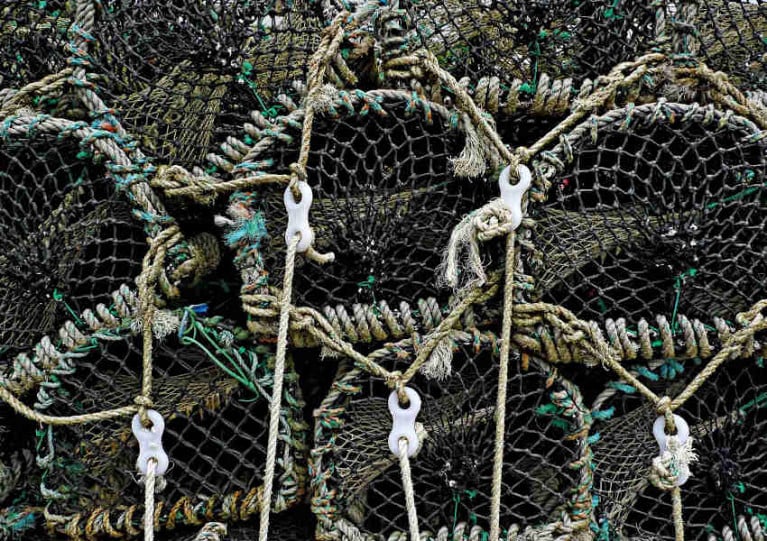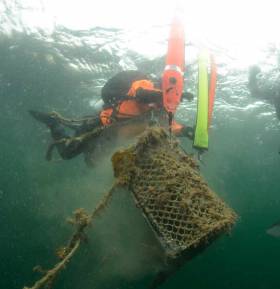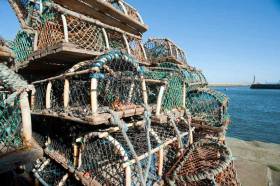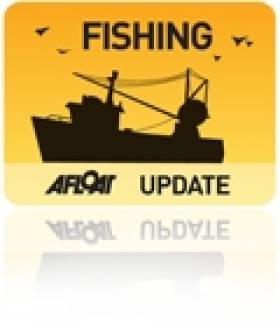Displaying items by tag: lobster pots
Port of Kinsale’s Lobster Pot Christmas Creation Named ‘Unusual Tree of the Day’ by Alastair Campbell
Tony Blair’s former spin doctor has bestowed an unusual honour upon the Port of Kinsale’s special Christmas tree.
Earlier this week, Alastair Campbell named the lobster pot creation by local fisherman Eamonn O’Neill has his ‘Unusual Tree of the Day’ on social media.
According to the Southern Star, O’Neill first installed the tree — comprising 170 lobster pots stacked 15ft high next to the harbour master’s office — a year ago, with the help of the local maritime community, to support Kinsale RNLI.
At the time, O’Neill said he was inspired by similar structures he’d seen while fishing along the west of Scotland.
This time around, as the Kinsale Advertiser reports, the lobster pot tree was dedicated to raising funds for The Well Project, which unites three local charities related to mental health and wellbeing.
And there may still be time for those in the area to make a donation and guess the number of pots in the tree for some fantastic prizes.
Campbell currently co-hosts the podcast The Rest is Politics with former Conservative MP Rory Stewart.
The UK’s Cruising Association’s Regulations and Technical Services group (RATS) has welcomed the move by the Scottish government to update its rules for marking lobster pots in Scottish waters.
The best practice guidance, which came into force on 20 June, makes unlawful the marking of a string of creels (lobster or crab pots) with anything other than a buoy made for that purpose.
RATS said it has been “vociferously campaigning” for clearer marking of static fishing gear and lobster pot markers since 2017, and will be pressing for England, Wales and Northern Ireland to follow suit.
More details on guidance for marking fishing creels in Scottish waters can be found on the Scottish government website HERE.
57 Lost Lobster Pots Pulled Out from the Seabed in Galway by Divers
From September 3-6, the Ghost Fishing Foundation, supported by Gesellschaft zur Rettung der Delphine (GRD) and Scubadive West, carried out a first of its kind ghost fishing gear removal operation (Operation “Stone & Pots”) off the West Coast of Ireland.
During operation “Stone and Pots”, a team of six expert technical divers joined by cameramen and biologists, recovered 57 lost lobster pots, hundreds of meters of rope and several fishing nets from the bottom of the Killary Fjord in Co. Galway.
Lobster pots are accidentally lost when their surface marker buoys get severed during storms or collision with boat traffic, but unfortunately, continue to fish when left unattended at the seabed. Much marine life was found dead in these traps although some lucky crabs, lobsters, conger eels and dogfish (a small shark species) were saved by the divers who released them just in time.
The retrieved lobster pots were taken on board a mussel boat, and offloaded in the local fishing harbour Rosroe Pier, where they were returned to the fishermen to use them once more. The locations of some of the pots were known to the team as their coordinates were recorded during a survey mission in May 2018, but most pots were found at previously undived locations and were alarmingly easy to find: the seabed is littered with them, and many more remain in situ to this day.
Ghost fishing gear is responsible for the needless suffering and death of millions of marine animals in the world’s oceans. It is estimated that 640,000 tons of fishing nets are lost or abandoned at sea each year.
On September 5th, the Galway Aquarium hosted a presentation to introduce the Ghost Fishing Foundation and GRD to the Irish public while the next day, the divers joined a beach cleanup in Grattan, Salthill organised by the Aquarium and Clean Coasts. Both side events were well attended and provided a good opportunity for the locals to learn about the work being done on an international level to protect marine life from ghost gear.
Ghost Fishing aims to return to Ireland next year and intends to establish a permanent chapter in Ireland for which experienced technical divers are needed.
UK Campaign To Make Static Fishing Gear Safer For Small Boats
#LobsterPots - Are lobster pots a danger to yachts? That’s the question posed by Yachting Monthly as the UK’s Cruising Association relaunches its campaign to make static-gear fishing safer for small vessels.
The CA has already received nearly 4,000 signatures on its online petition to the Department for Environment, Food & Rural Affairs (DEFRA) to seek “views regarding forceable regulation among other options” for improving the way static fishing gear is marked.
Before its original petition was shut down until after this summer’s UK general election, nearly 6,000 people had signalled their support for the initiative which also has the backing of CA patron and yachting legend Sir Robin Knox-Johnston.
The RYA has additionally launched an online reporting form for boaters to identify incidents of entanglement with poorly marked static fishing gear.
“We think it is time for everybody with an interest to work together to find a solution, particularly one that is cheap and practical for our fishermen,” said a CA spokesperson.
Yachting Monthly has more on the story HERE.
Sea-Fisheries Officers Return Undersize and V-notched Lobster to Sea
#lobster – Sea-Fisheries Protection Officers from the Sea-Fisheries Protection Authority (SFPA) confiscated nine lobsters from a vessel's 'keep' cage in Kinsale, Co Cork this morning, Friday 12th October. Eight of the lobsters were v-notched, one was undersize and all were berried or egg-bearing. The officers embarked on an early morning sea patrol from Kinsale using an SFPA RIB patrol craft. All of the lobsters were taken and returned to the sea alive. The keep cage where the lobsters were found was identified as being associated with a local vessel and a case file will be prepared and forwarded to the Director of Public Prosecutions.
Our lobster stocks are protected by a minimum landing size of 87mm. There is a strong network of fishermen's associations and Co-ops who contribute significant time and effort into conservation schemes and their good work ensures the continuation and availability of a viable lobster fishery. A key conservation element is the v-notch scheme where a small mark is cut into the tail of any female lobster found - once marked in this way, it is illegal to land, possess or sell such a lobster. A certain percentage of the population is therefore protected for breeding, thus boosting egg production and in turn recruitment to the stock.
The SFPA works consistently with the inshore sector to ensure compliance with fisheries regulations, for example, a "Guide to Compliance for the Irish Inshore Fleet" was developed between the SFPA in conjunction with key stakeholders in 2010 – this is a concise guide that summarises the principal requirements that apply to Irish fishing vessels under 15 meters operating in Irish inshore waters. The continuing provision of essential information supports the SFPA and industry in their work towards building a culture of compliance. This partnership approach benefits both the fishing industry and the SFPA and underpins the day-to-day efforts of fishermen to protect their livelihoods by complying with legislation that conserves fishing stocks for long-term sustainable exploitation. It is consistent with the SFPA's legal remit to promote compliance with and deter contraventions of sea-fisheries law and food safety law.
Micheal O'Mahony, Board Member of the SFPA said: "The responsible management of our lobster stocks by local cooperatives and fishermen has protected the fishery from depletion through over-exploitation. Lobster fishermen are protecting their livelihood for tomorrow by protecting the lobster resource today. It is important that the misbehaviours of a minority of lobster fishermen in terms of catching and keeping undersize and immature fish is stopped and the SFPA is committed to playing our part in supporting the excellent efforts being made by responsible fishermen by continuing to conduct these inshore sea patrols."
#MCIB - The families of two fishermen found dead at sea off the Skerries last April may never uncover the circumstances that led to their demise. But the official report into the incident indicated that the absence of lifejackets was a significant contributing factor.
Ronan Browne (26) and David Gilsenan (41) were reported missing on the evening of 1 April after failing to return from a trip tending to lobster pots.
Their vessel, Lady Linda, was found the following morning upturned in an oil slick off Clogherhead with no sign of the crew.
It wasn't until a week later that their bodies were discovered caught in the vessel's fishing gear some five miles east of Clogherhead, as previously reported on Afloat.ie.
Post-mortem results found that both men died from drowning, with Gilsenan also showing signs of hypothermia.
With no eyewitnesses to the incident, the report by the Marine Casualty Investigation Board (MCIB) indicated a number of possible causes from eqiupment malfunction or shifting of lobster pots on deck, to the wave height and weather conditions on the day, which were reportedly deteriorating when the boat left port.
It also said that Browne and Gilsenan "were lifelong friends, both men were experienced and qualified marine engineers in the fishing vessel industry. Both men were experienced in boat handling and fishing and had worked together on many occasions."
But the report emphasised the lack of personal flotation devices (PFDs) on board, and noted that emergency equipment was stored under the deck and not easily accessible.
The MCIB's recommendations include a review of the code of practice for fishing vessels under 15m to establish "revised stability critera" and ensuring that all boats are fitted with automatic radio beacons that deploy upon capsize.
In a separate incident, lack of proper maintenance led to an unlicenced boat taking on water off Co Kerry last August.
The Claire Buoyant was carrying one crew, five passengers and 21 sheep from Beginish Island to Ventry when the vessel began to lose stability.
Skipper Eoin Firtear - who the MCIB described as having "limited sea-going experience" - and his five passengers were rescued by passenger ferry. All sheep were jettisoned overboard, with 18 eventually recovered.
The report reminded that the carriage of livestock should only be undertaken in appropriately certified vessels.
- MCIB
- Marine Casualty Investigation Board
- report
- Lady Linda
- Clogherhead
- Ronan Browne
- David Gilsenan
- lobster pots
- Fishing
- drowning
- hypothermia
- missing
- malfunction
- wave height
- Weather
- lifejackets
- Personal Flotation Devices
- PFDs
- Code of Practice
- stability
- Radio
- beacon
- maintenance
- unlicenced
- Co Kerry
- Claire Buoyant
- Sheep
- Passengers
- Beginish Island
- Ventry
- Eoin Firtear
- Skipper
- Rescue
- Livestock




























































